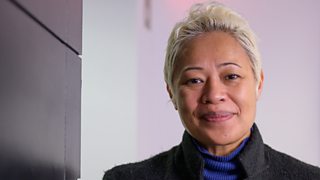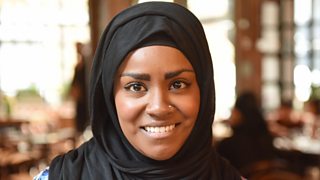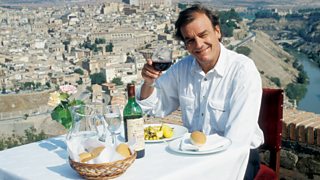Nine things we learned from Monica Galetti's Desert Island Discs
Monica Galetti is chef proprietor of Mere in London and has been a judge on Masterchef: The Professionals for over a decade. Her first memories are collecting eggs and mangoes on the family plantation in Samoa where she was born before moving to New Zealand as a child. She trained in hospitality and made a name for herself in the cut-throat world of competitive cookery. She was previously senior sous chef at Le Gavroche restaurant in London. Here are nine things we learned from her Desert Island Discs…

1. She sliced the top of a finger off giving a public cooking demonstration
“Oh my gosh, it was horrible. I had a little girl on stage with me helping, this poor little girl - I hope I haven't put her off cooking for life? She says: ‘Are you gonna be alright?’ ‘So yeah, don't worry.’ She goes: ‘Okay, because you're bleeding everywhere.’ And I was like, ‘Oh, it's nothing.’ And you know it was, until I got off the stage and they try to find the other part of it. I’d just wiped everything off the bench into the bin because I had a little girl with me and I didn't want her to freak out.”
I just had this crazy hunger to learn. They'd all go home, and I'd stay there until about two in the morning, knocking up a three course meal. And I thrived on it
2. She was born and spent her early years in Samoa
Monica describes the island of Upolu, where she is from, as “paradise with beautiful clear waters, some of the friendliest of people you will come across.” She lived on a plantation: “We have a family plot, a big family plot. There's like a main house there and then around that will be smaller homes of other relatives. It was just a great place to grow up as a child, you were never alone. There was always someone to play with.”
3. She saw cooking on a grand scale when she was very young
“I was just so curious,” says Monica. “The majority of the hard work that was done was what we call an umu, when all the food is sort of baked in huge pits. They make a fire with volcanic rocks and when the fire dies down you take it all apart. The food’s been prepared, mixed by the women and the men, like a whole side of a pig, for example. The vegetables are wrapped in banana leaves and fish, like so. And you then lay them inside these rocks and cover it up with banana leaves - it's sort of roasting and steaming at the same time. So I used to try and help out. I think I got in the way more than anything.”
4. As a child she moved from a small island to a big city
At the age of eight Monica moved from the island where she’d been born to Wellington, the capital city of New Zealand. “It took a while to settle into food being so different,” she says. “And also, having to learn English. And I just missed blue sky and ocean. Even though there was a lot of it in New Zealand, it just wasn't the same. I missed walking around barefoot, because I just found the ground too cold. Yeah, it was a big change for us.”
5. Competitive cooking brought her to Europe
Monica had started working in a fine dining restaurant in Wellington when the chef there asked her if she’d like to try her hand in a cooking competition. “And I said, ‘Yeah! I'd like to give it a go.’ Turned out that I now had a bit of a flair for the competitions. I went on to win the regionals, and Wellington, and then I won the national competitions overall in New Zealand. And that took me abroad to start competing, representing New Zealand and Oceanics. And then in European competitions!” She laughs and says: “You know, I just had this crazy hunger to learn. I mean, I'd finish work at midnight, and my boss would then get boxes of ingredients out, they'd all go home, and I'd stay there until about two in the morning, knocking up a three course meal. And I thrived on it.”
I remember making for the first time Samoan food for Michel and sort of being nervous about it. I think I did steamed pork buns
6. A special reason brought her to London and it meant a demotion
“Growing up as a young chef, the cookbooks I had, and I remember, were the Roux brothers. The Roux brothers for me back then - and now! - you know, it's like gods of cooking. I’m thinking, wow, it’d be amazing to just meet them one day and whilst I was travelling, I sent my CV off to, of course, the Waterside, to the Gavroche - basically the top restaurants back then in the 90s. And Le Gavroche were the first to reply. It meant stepping back down to a commis position and I was already chef de partie. I’d been cooking like six, seven years already but I didn't care as I had my foot in the door of the most amazing kitchen. And you know, if that's what it meant, then that's what it took.”
7. Tragic news took her back to New Zealand
“I did my first year at the Gav,” says Monica.” And I got a phone call on this Wednesday morning. I remember Michel [Roux Jr] giving me the phone and telling me, you know, come in the office and take the phone call. It wasn't a good phone call. My partner at the time was back in New Zealand and had passed away overnight. So I had to leave and go home. I remember I trashed Michel's office. I absolutely destroyed Michel's office. So I went home, back to our house, dealt with the funeral and everything and I spent a year back at home. Then I rang up, Michel. And I think he said, ‘How's it going?’ And I just said ‘I'm not doing well, chef.’ And he said: ‘Come back.’ I just couldn't be in New Zealand anymore. It was too painful to be there. There's just so many memories. So I had to leave and I knew I wasn't coming back. I wanted to escape and the Gavroche was the perfect escape. That's all I could focus on. You know, to get through it. It was all I knew.”
8. Monica believes that top restaurant kitchens can open their doors to a more diverse range of people
So why hasn’t that happened yet? “I tend to think that it's because of the backgrounds that we come from,” says Monica. “Culturally, you know, I come from a Samoan background where the food is very humble, it's very simple. The world of fine dining can be frightening, if it's not what you grew up in. I think when the doors are just thrown open, and you're given the confidence to step into that world without any barriers at all, and you're made to feel very welcome in it, that you belong, then it's no longer as frightening.”
Happily she thinks that changing tastes and interests will help make that happen. “And I think the interest of food has shifted to be more inclusive, which makes us feel that actually ‘Yeah, my style of food is going to be alright, I can give it a go. I remember making for the first time Samoan food for Michel and sort of being nervous about it. I think I did steamed pork buns. Basically streetfood I was offering up for chef Michel.” And did he love it? “Absolutely,” laughs Monica.
9. Monica met her husband at work
David was the sommelier at Le Gavroche and Monica was working on the pastry section at the time. “There's some (wine) cellars outside the Gav,” says Monica. “And he used to be out there working. And I was in the pastry and he used to always knock on the window to say ‘Hello’. He said he knew he was in love with me when he first saw me though. That's what I tell everyone - he fell in love with me at first sight.”






